From the Atlantic to FYORD
Networking event concludes this year's “Floating University”
“This is oceanography: years of planning, weeks of ship time and days of seasickness culminate in hours of careful measurements for a few, valuable data points. You don't learn something like this in the lab,” says Amadou Biteye from Senegal enthusiastically. “Going through the whole process of taking and analysing a single sample, I now really understand where the data comes from and appreciate what's in the global datasets for each measurement.”
The 24-year-old is one of eleven young marine researchers who took part in this year’s “Floating University” on board the research vessel POLARSTERN, led by Dr Björn Fiedler from GEOMAR Helmholtz Centre for Ocean Research Kiel. The training phase at sea is part of the international master’s programme “Climate Change and Marine Sciences” within the framework of the competence centre West African Science Service Centre on Climate Change and Adapted Land Use (WASCAL) funded by the German Federal Ministry of Education and Research (BMBF).
On their journey from Mindelo, Cabo Verde, to Bremerhaven, Germany, seven female and four male students from nine West African countries learned and trained classical marine research methods. They took measurements of carbon dioxide concentrations in the ocean and the atmosphere and collected data on biogeochemical and ecological changes in the tropical and subtropical Atlantic. They also studied the biomass of zooplankton and fish as well as the structure of the food web in different ocean regions. In addition, the documentation and communication of the scientific work was also part of the students' training programme. Nine experienced scientists from GEOMAR, Kiel University, Leibniz Institute for Baltic Sea Research Warnemünde (IOW), Universidade Técnica do Atlântico Mindelo (UTA) and University of Oslo supported the group.
“I learned a lot that I could not have learned on land, also, what it means to be on station and take samples on a moving ship,” says Osvaldina Julião Fernandes Soares from Cabo Verde.
Amie Ndure from The Gambia agrees: “In the Master's programme we collected theoretical knowledge, but applying it to measurements and observations at sea is an invaluable experience.”
“The ocean plays an important role in our climate, and on board, we learned how data collection fits into the big picture of climate research,” explains Christelle Akonde from Benin.
After the expedition, the group spent a week in Kiel to evaluate the data collected during the cruise and to get to know GEOMAR. They also exchanged ideas with Master’s and PhD students of the Foster Young Ocean Researcher Development (FYORD) programme of Kiel University and GEOMAR.
"After the networking between Master’s students from Kiel and West Africa provided a successful example of a fruitful, interdisciplinary and intercultural exchange, international students and young scientists will be integrated into FYORD in an even more targeted manner in future", says FYORD coordinator Dr. Christine Haunhorst, who is responsible for promoting young researchers at the Kiel Marine Science (KMS) research centre at CAU.
“To study the ocean, an education in the lecture hall and laboratory alone is not enough. Research at sea is very demanding and challenging. You can only learn about it under authentic conditions,” summarises Dr Björn Fiedler. “In addition, the exchange between the FYORD and WASCAL students at GEOMAR provided an excellent opportunity to jointly discuss the students’ different perspectives on marine science topics and their relevance for society. Such intercultural exchange can only be achieved in face-to-face meetings.”
While some of the students will return directly to their university in Mindelo in Cabo Verde, others will continue their analyses and work as part of their Master’s theses in Germany and France. Among other aspects, samples they brought with them will be analysed in the GEOMAR laboratory to determine the distribution and occurrence of microplastics in the ocean and in fish.
Background: WASCAL Master's Programme "Climate Change and Marine Sciences
In the Master's programme “Climate Change and Marine Sciences” within the framework of the competence centre West African Science Service Centre on Climate Change and Adapted Land Use (WASCAL) funded by the German Federal Ministry of Education and Research (BMBF), students from West Africa learn scientific and academic skills in the fields of climate, marine sciences and management from the international to the regional level. In this way, they prepare for subsequent postgraduate studies or careers for example in environmental management or industry, consultancies or government agencies. In 2021, the WASCAL Master’s programme on Cabo Verde was selected as an action of the United Nations Decade of Ocean Research for Sustainable Development. In 2022, 14 Master’s students participated in the first “Floating University” on board the research vessel MARIA S. MERIAN. In 2023, the “Floating University” took place during the expedition PS135-2 on research vessel POLARSTERN which is operated by the Alfred Wegener Institute, Helmholtz Centre for Polar and Marine Research (AWI).
Background: Foster Young Ocean Researcher Programme FYORD
With the Foster Young Ocean Researcher Development (FYORD) programme, Kiel Marine Science (KMS) and GEOMAR Helmholtz Centre for Ocean Research Kiel support the development of young ocean researchers across all status groups from Master students, PhD students to postdocs. The aim of the jointly organised, inter-institutional and interdisciplinary programme is to facilitate a successful career in marine topics and to establish a lively, interdisciplinary scientific network on the topic of marine research in Kiel. All target groups should not only benefit from different experiences, but especially develop new and eligible research questions and receive impulses for their own career paths.
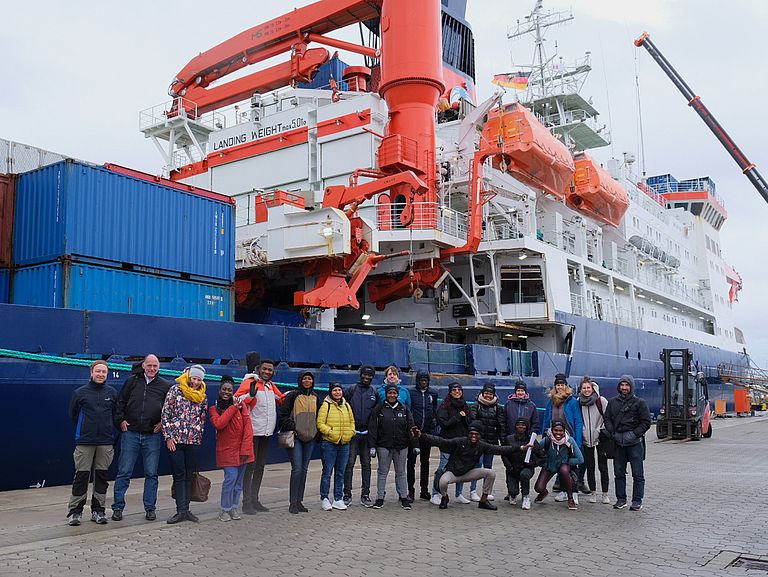
On 11 April 2023, the participants of the "Floating University" on board POLARSTERN returned to Bremerhaven. Photo: Sarah Kaehlert, GEOMAR
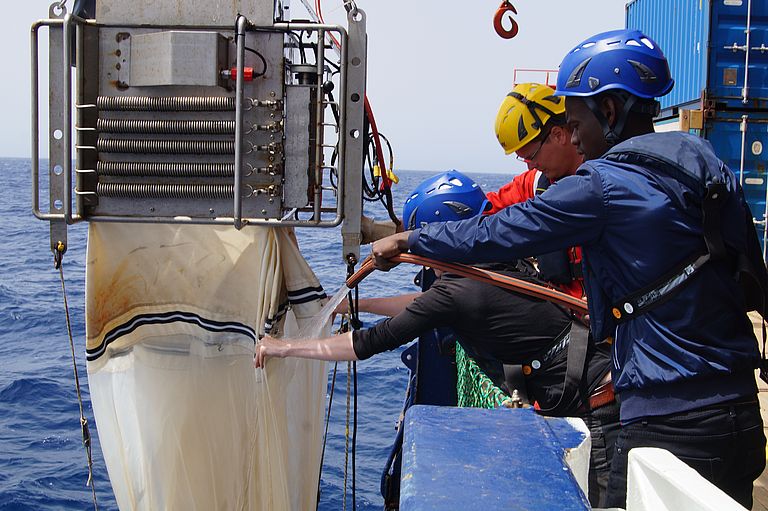
Rinsing a multi-net to optain plankton samples from different water depths. Photo: Björn Fiedler, GEOMAR
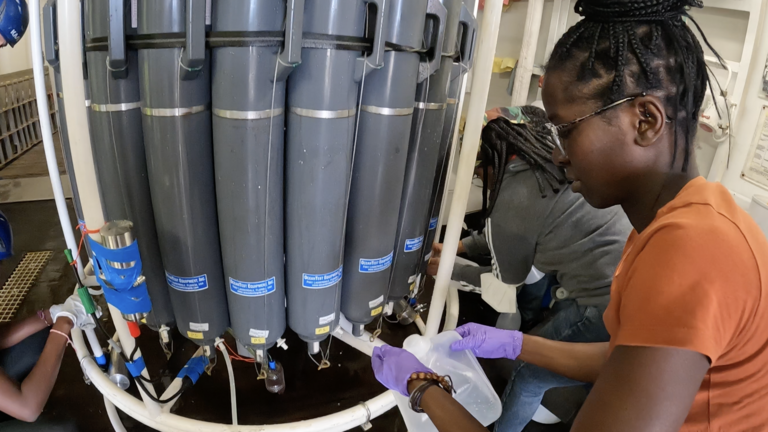
Collecting water samples on board the POLARSTERN. Photo: Fiona-Elaine Strasser, GEOMAR
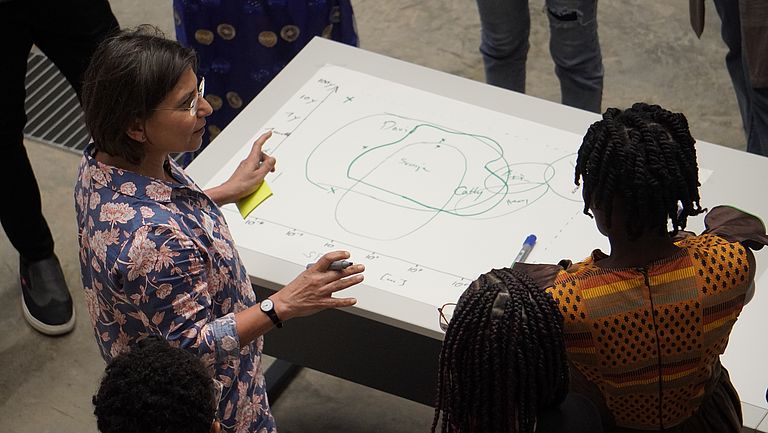
Preparations for the WASCAL "Floating University" at the Ocean Science Centre Mindelo. Photo: Fiona-Elaine Strasser, GEOMAR
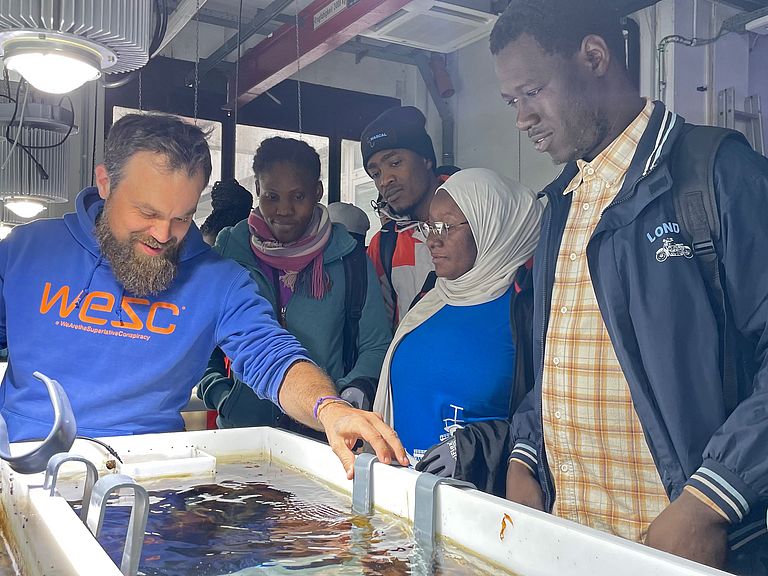
After the expedition, the group analysed their data collected during the cruise in Kiel and got to know GEOMAR. Photo: Björn Fiedler
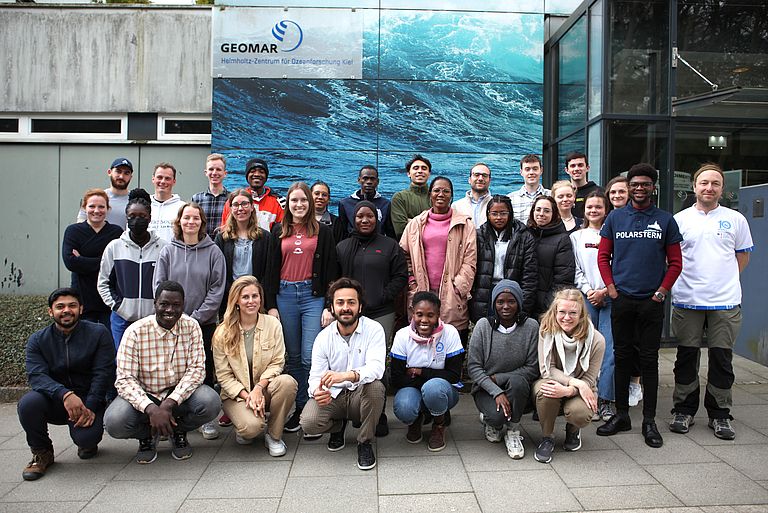
The meeting with participants of the FYORD programme provided a successful example of a fruitful, interdisciplinary and intercultural exchange. Photo: Tobias Hahn, Kiel University


